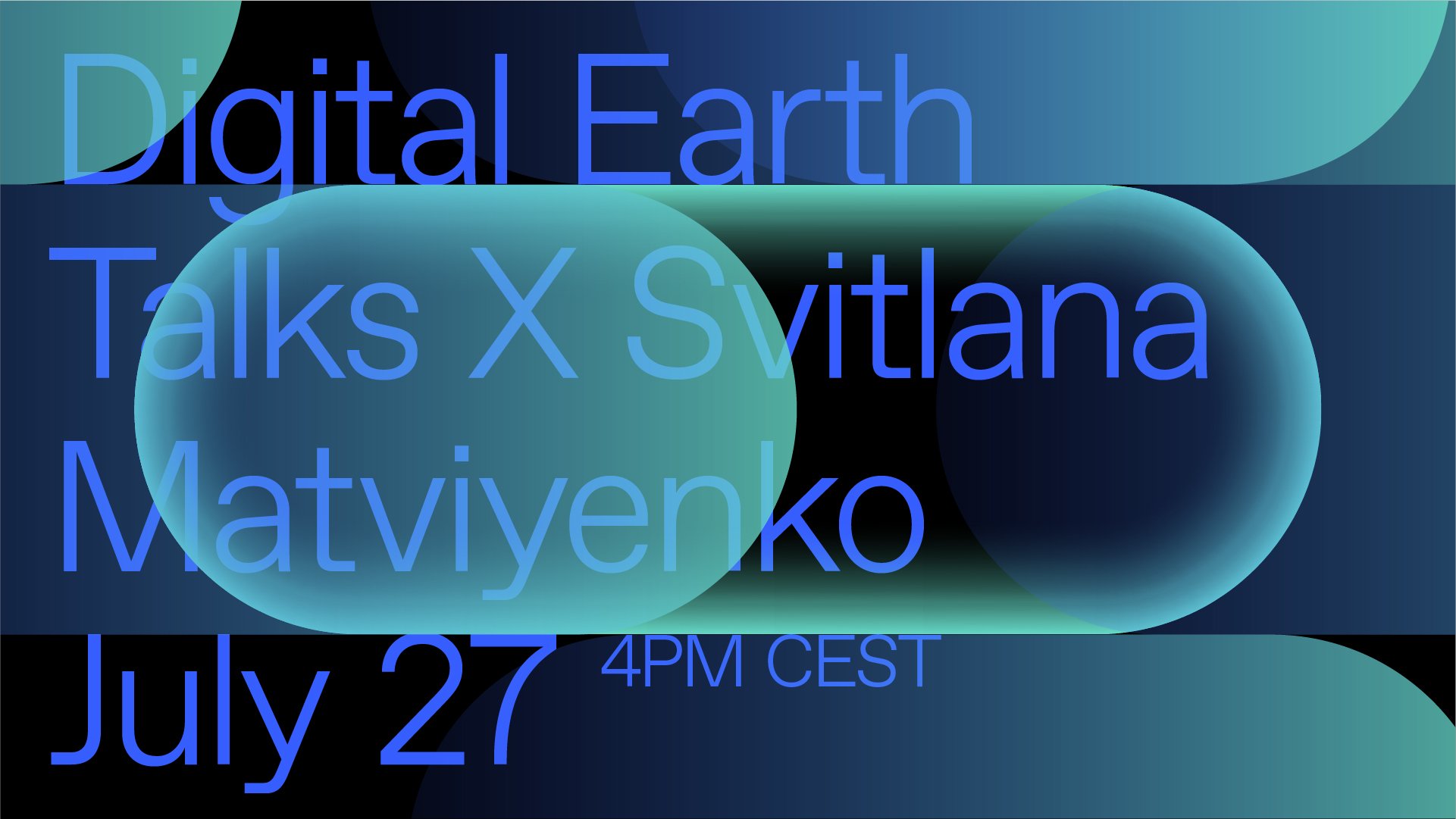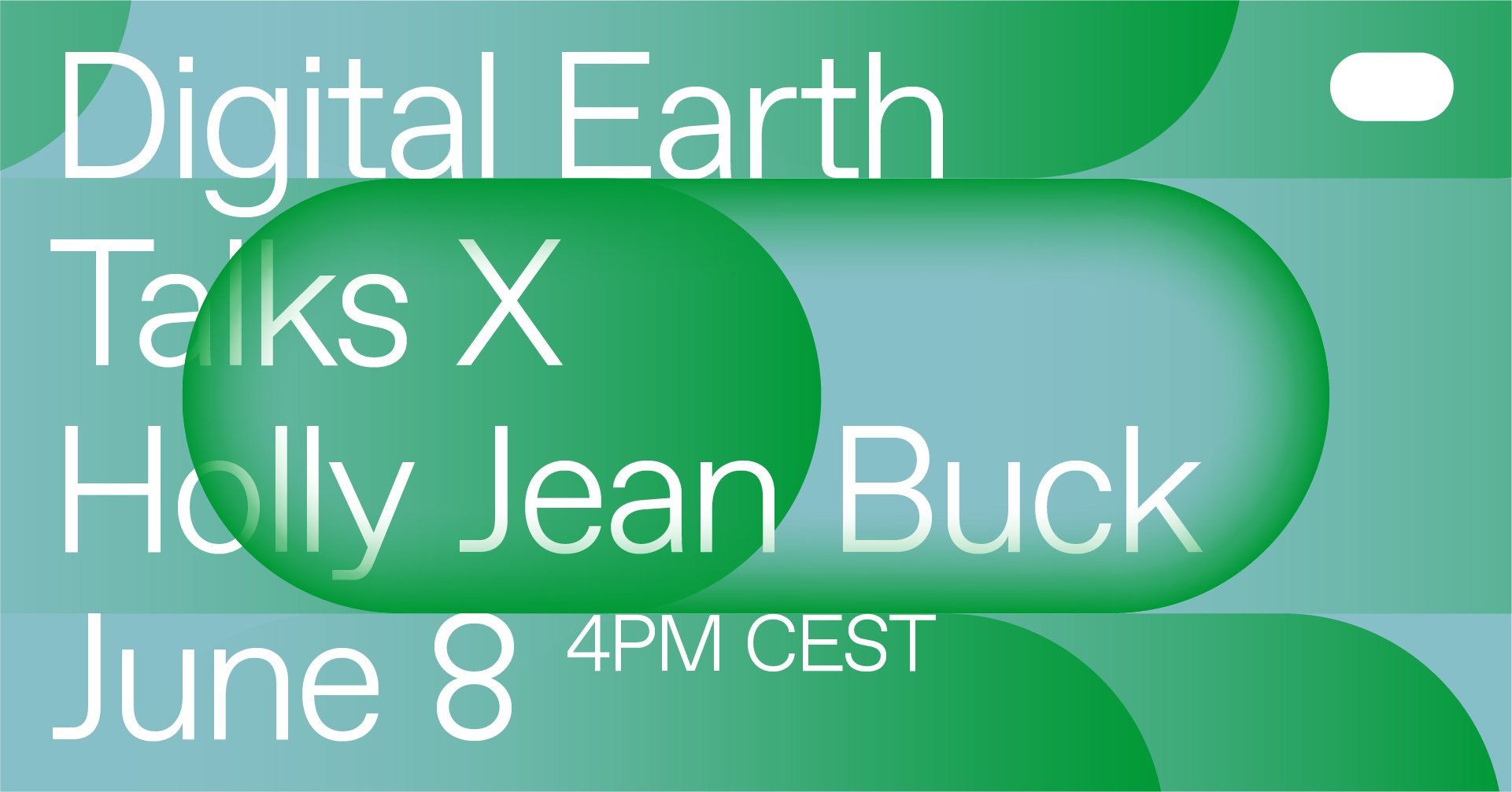#3 Digital Earth Talks x Maya Indira Ganesh
The third Digital Earth Talk features Technology Researcher Maya Indira Ganesh, thinking about setting and owning the terms through which we interrogate new/old technologies and re-fashion them in our work. You can watch the video below!
In this proposition, Maya Indira Ganesh examines AI as shaped by the shifting definition of the human originating in various epistemologies of inclusion and exclusion. Then, if AI is generated by conceptions of the human, what kinds of humans are they serving, and how might AI in turn shape our own idea of what constitutes a person? Drilling through knowledge systems and human rights movements, Ganesh looks for the disparities between the implementation of AI and the processes of dehumanisation these implementations entail. Through a patchwork of references, she suggests that before we imagine humane digital earths, we should begin imagining humane perceptions of humans.
We hosted a live discussion with the Digital Earth Fellows in conversation with Maya Indira Ganesh, moderated by Nora N. Khan, on May 4, 4 - 6PM CET on Zoom.
Beauty Blooms: Abundant and Generous Digital Futures
STATEMENT FROM THE SPEAKER, MAYA INDIRA GANESH
Break with modes of knowledge-production that do not serve you and set the terms of engaging with new technologies
The imagination of a more humane digital earth to come requires abundance and generosity; an excessive spilling-out of known categories of the human; a transformative break with exclusionary and violent systems of knowing and knowledge-making.
I want to look at the temporalities folded into and taking shape through ‘AI’, digital, and ‘autonomous’ technologies through struggles of Indian farmers, the attacks on the digital and fleshy bodies of women, Black people, Dalits, and Indigenous people. What kinds of futures do we imagine through new technologies, and how have we understood the legacies of our pasts as shaped by the information technologies? In this talk, I think for myself and with you about the modes and approaches that make connections rather than separations, between knowledge systems, time frames, and political movements. Let us set and own the terms through which we interrogate new/old technologies, and re-fashion them in our work. Beauty blooms even as the world is trying to break our spirit.
Participants
Speaker • Maya Indira Ganesh is a technology researcher whose work investigates the social, cultural, metaphoric, and political implications of the 'becoming-human' of machines, and vice versa. She is completing a PhD about the material-discursive shaping of “AI” and autonomous systems in terms of “ethics” and “intelligence”. She has worked at the intersection of gender justice, technology, and digital (un)freedom of expression with NGOs in India and Europe. She lives in Berlin.
Moderator • Nora N. Khan is a writer of criticism on digital visual culture and philosophy of emerging technology. Her research specifically focuses on experimental art and music practices that make arguments through software, machine learning, and artificial intelligence. Khan is a professor at Rhode Island School of Design, in Digital + Media; she teaches graduate students critical theory and artistic research, critical writing both for artists and designers, and history of digital media.
Fellow • Alexandra Anikina is a researcher, media artist, filmmaker, and curator working with the themes of algorithmic culture and critical posthumanities. Anikina uses the history of Soviet media technologies to probe the pervasive Western cosmologies of technological progress and to critique the temporalities of data governance and control.
Fellow • Antonio Macotela is a multidisciplinary artist, exploring the idea of economy as a mediatory device through which social relations are established. Macotela draws a parallel between the Q’aqchas - a group of pirate ore miners in the eighteenth century - and a group of contemporary hackers in Spain. Utilising the figure of the hacker, they explore narratives of resistance and strategies of subversion.
Fellow • Nolan Oswald Dennis is an interdisciplinary artist. They engage with the planet from a position of estrangement, where access to the planet as a spiritual-material object has been denied, and proposes reengineering tools and methods of measuring, monitoring, modelling, and otherwise remotely accessing the world for a project of alternative planetary imagination linking black and indigenous techno-cultures in Africa, Asia, and Latin America.
Fellow • Sahej Rahal is primarily a storyteller. His performances, installations, and AI programs narrate a mythology that interrogates narratives shaping our present. Rahal will create a mythology that remixes folklore, urban legends, and science fiction to interrogate the mythic narratives that construct our digital reality.
Fellow • Sheila Chukwulozie defines herself as an Igbo Cyborg contending with the state of being simultaneously fixed and fluid, object and subject, matter and spirit, digital and analog, able and unable, native and migrant. They are working with Uzoma Chidumaga Orji. They will explore a paradigm of verbal technology rooted in Igbo cosmology, and specifically in the concept of time. Through storytelling, linguistic excavations, and investigations of perceptual apparatuses, the duo advances the notion of Igbo proverbs as a technology.
Fellow • Uzoma Chidumaga Orji creates visual metaphors, scenography, and interactive digital experiences that interrogate post-colonial identity crises. They are working with Sheila Chukwulozie. They will explore a paradigm of verbal technology rooted in Igbo cosmology, and specifically in the concept of time. Through storytelling, linguistic excavations, and investigations of perceptual apparatuses, the duo advances the notion of Igbo proverbs as a technology.
Fellow • Sondra Perry is an interdisciplinary artist who works with video, computer-based media, and performance. She explores themes of race, identity, family history, and technology. Perry will unpack the relationship between industrial metal minerals and geological time, slavery, and industrialised labour in the United States and beyond. Recently, in response to the Black Lives Matter movement and racial violence, their project questions the role of art and its capacity for causing change.
Fellow • Temitayo Ogunbiyi explores environment, line, and representation. Moving between mediums such as drawing, painting, and installation, her work links current events, anthropological histories, and botanical cultures. Ogunbiyi confronts systems of surveillance and behaviour in digital space through notions of play. By considering the Planetary Sensorium as a monitoring structure birthed from Western constructs, she investigates how play can subvert and highlight its pervasive surveillance systems.
About Digital Earth Talks
How do we imagine a humane Digital Earth to come? Join the discussion and explore the visions of leading voices in art, tech, and philosophy from around the world.
Discover our past events here:



